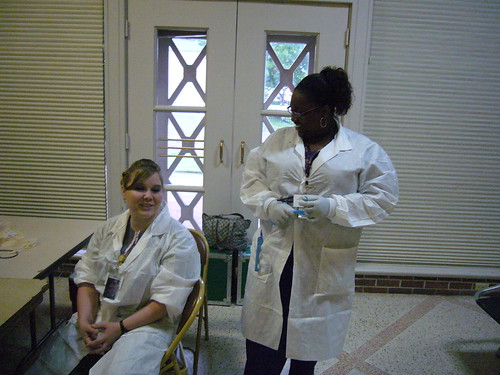And there’s something that really bothers me about the United Blood Services center that I visit: they really overemphasize all of these stupid rewards programs for frequent donors. It’s tacky as hell, and somehow a little insulting. No, I don’t want to fill out a slip that will enter me in a sweepstakes to win a car. No, I don’t want to log in online and trade my points for prizes.The author says she would prefer cash incentives to increase supply, or even no compensation at all. I agree with her but do see a potential for abuse. Read her original post and my comment here.
Showing posts with label Health. Show all posts
Showing posts with label Health. Show all posts
Thursday, May 20, 2010
Is Blood Donation Too Much Like Gambling?
There's a very thoughtful post on blood donation over at this field is required. The author writes:
Tuesday, May 11, 2010
Would I Have Opposed Nutrition Facts Labels?
Nutrition Facts labels have been required on most foods in U.S. grocery stores since 1990. I was 4 years old at the time, but I can just picture the little economist inside me opposing the policy.
I would have raised all sorts of arguments about how we shouldn't make it harder or more expensive for firms to do business and how the labeling law was creating a barrier to entry that many food producers could not overcome, resulting in a less diverse grocery store selection. I'd use a bootleggers and Baptists analogy, which involves two morally opposed groups agreeing on a policy for different reasons. Health advocates would support the ban for obvious reasons, but so would corporate food manufacturers, which would now face less competition and thus be able to charge higher prices.
I've been mildly opposed to New York City's law that calorie counts be displayed on restaurant menus for much the same reasons, but perhaps I shouldn't be. The sacrifices required to implement Nutrition Facts labels seem well worth it in retrospect, because they have enabled consumers to make better decisions. This information gain has put pressure on food producers to improve the health content of their products or at least offer healthy alternatives.
One more devil's advocate point: as I said in my prior post, we have to measure the value of something by how much better it is over the next-best alternative. Without Nutrition Facts labels, most people would still know that an apple is healthier than a candy bar, even if they can't quantify the calories, cholesterol, or other parameters involved. How much does knowing the hard numbers really improve health outcomes?
Saturday, May 1, 2010
Wii Fit as Accountability
In the same vein as what I wrote about yesterday:
My fiancee recently got herself a Wii Fit
Sharon: "I usually just switch it over to regular TV while I'm doing this."
Me: "Couldn't you have just done that without the Wii?"
Sharon: "Yeah, but I'd usually just be sitting there like you (sprawled lazily on the couch)."
The Wii remote
Perhaps I'll write a longer series about this concept. If you have any ideas, feel free to e-mail me or leave a comment.
Thursday, February 11, 2010
Nursing and 12-Hour Shifts
CC image from joguldi on Flickr.
Why do many nurses work 12-hour shifts? For guidance, I turned to my mother, who worked as a nurse for many years:One reason is continuity of care. Patients have fewer people caring for them and are usually happier with a nurse they can get to know a little. Much easier staff scheduling for management as well.
Also, incentive for employment. During normal times when it's not really busy you can work 3 days a week and it's considered fulltime.Workers' productivities vary throughout their workdays, and it's likely that a nurse or anyone else will not be as sharp at the 11th hour of their workday as they were at the 1st hour. But, as Mom suggests, this trade-off may be more than compensated for by the fact that a patient doesn't have to deal with an endlessly revolving door of staff, with each shift having to brief the next on the patient's condition.
Another benefit for the nurses is that, by coming into work fewer days, they save on some costs that workers have to endure to get to work every day, most notably gasoline. And their schedules are not likely to coincidence with rush-hour traffic, making their commutes shorter.
Many other jobs, however, work better under the 9 to 5 schedule. For projects that require teamwork from several employees (or even several firms), it makes sense for the workers to all be there at the same time for more effective collaboration and communication. Additionally, many people prefer 9 to 5 because it gives them a predictable schedule week in and week out, making it easier to plan social events. Of course, with jobs such as nursing that require staffing 24 hours a day, not everyone can work "normal" hours.
For further reading, I suggest this NurseWeek article from 1998 and this diagram showing how the days-off schedule for 12-hour shifts could work out over a 2-week period.
Subscribe to:
Posts (Atom)
-
I just got a targeted phone pitch from the Washington Nationals season ticket office. So targeted, in fact, that it reminded me of the re...
-
I can apply for loans, communicate with doctors, and do any number of other sensitive things online, but to vote I must go somewhere (which ...
-
There's been renewed speculation that a new version of the iPhone is coming out this summer and possibly a Verizon version as early as ...

.jpg)
